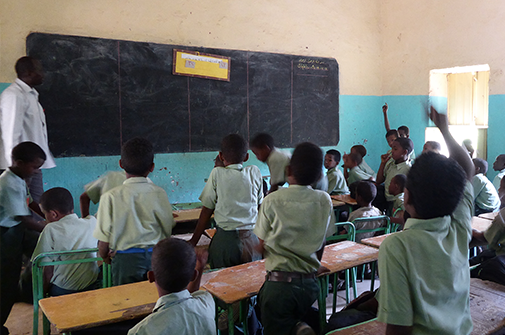“In Sudan, it is important to improve the teaching skills of primary school teachers”
Jean-Luc Fauguet is a sociologist at the University of Aix-Marseille and a senior international expert in education and training. Mohamed Nour is a lecturer at Red Sea University and a senior national expert in education and training.
Why was a baseline study conducted?
Jean-Luc Fauguet – At the start of the project, we were faced with a lack of information on pre-service training for primary school teachers in Sudan. So, we had to collect specific information about the faculties of education and the training programmes they offer to ensure that our recommendations – and the future public policies – are based on reliable, comparable and updated data.
Mohamed Nour – More specifically, we needed to obtain two types of information: firstly, quantitative data to have objective information and, secondly, qualitative studies to understand the processes at work. Our study therefore brought together these two approaches.
What type of quantitative data did you collect?
Mohamed Nour – For the quantitative part, we distributed three questionnaires which aimed to have an overview of the teaching policy of each faculty of education. The first questionnaire was for Deans of faculties of education, the second for trainers and the third was filled in by student interns. These questionnaires were accompanied by a data sheet, which had to be filled in by each of the 14 faculties of education. It collected information on their staff numbers, the way they operate, their material resources, the content of their training programme, the profiles of trainers, the skills required for future teachers, the type of placements offered, etc.
How did you go about the case studies?
Jean-Luc Fauguet – Our objective was to have a vision as comprehensive as possible of the various possible cases, by identifying different teaching methods, and different profiles of trainee teachers, schools and students. We selected the States of Khartoum, Kassala, the Red Sea and the White Nile, which had this diversity.
Mohamed Nour – For each of these four States, we conducted interviews and made direct observations to look at:
• The management of schools and pre-service teacher training, with meetings with representatives of the Ministries of Education and local representatives;
• The training processes in the faculties of education, where we attended lessons and discussed with the trainers and trainee teachers;
• The teaching practices in primary schools with, each time, a visit to a school in a rural area, a school in an urban area and a school receiving “vulnerable” students (refugees or displaced populations).
What are your findings from your classroom observations?
Jean-Luc Fauguet – This work has allowed us to gain a better understanding of the perception of teachers and to observe their practices, their work environment… One observation concerns both the faculties of education and primary schools in terms of the teaching method: it consists of variations of “interactive lessons” in the form of learning rules and lessons by heart through group recitations. The pupils rarely use their exercise books when they have them, their pens or their textbooks if they have them. There may be economic reasons for this, related to the lack of school supplies, but the main reason is that writing has very little legitimacy in the eyes of the trainers. It therefore has little or no place in the learning process. To address this, we are going to work with the trainers and future teachers to increase the legitimacy of writing as a teaching method, in addition to oral exercises. We have already started during the training workshops for trainers, which started in June 2019.
What ways to improve teacher training have you identified?
Jean-Luc Fauguet – The study shows that it is important to strengthen the teaching and professional skills of teachers, in addition to their training in the various subjects taught in primary school (maths, science, history, geography, English and Arabic). As for the placements, they should be spread out over the entire 4 or 5 years of training. This would make it possible to alternate between theory and practice, and therefore to apply the knowledge and teaching methods presented during the courses. These are aspects that will be discussed with our partners in the context of the reform of the teacher training curriculum, which the project will contribute to structuring and harmonising.
Mohamed Nour – Another important point concerns the coordination between the various institutions involved in pre-service teacher training. Its organisation is very fragmented. We have noted that there is relatively little discussion between the Ministry of Higher Education, the Ministry of General Education and each of the 14 faculties of education. Part of our work will involve promoting exchanges and cooperation between all these stakeholders. We set the momentum in motion during an activity launched after the finalisation of the study in the spring of 2019: the process to build a new framework for pre-service teacher training brings together the staff of the 14 faculties of education and representatives of the Ministries of Education in workshops. We will also try to build links with the “in-service teacher training” component of the EQUIP programme, which is managed by the British Council.
 Consult the EQUIP project sheet
Consult the EQUIP project sheet
 More about France Education International: www.ciep.fr
More about France Education International: www.ciep.fr


